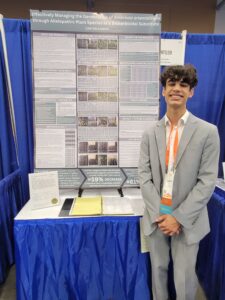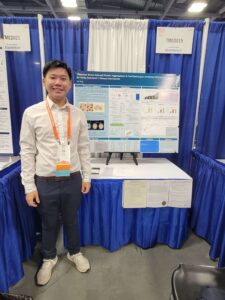Welcome, Students!
Welcome to the Student Resources page! Here you’ll find everything you need to prepare for the State Science Fair and make the most of your experience. Whether you’re just getting started or finalizing your project, this page is packed with helpful tools, tips, and guidelines to guide you through the process.
01
Getting Started with Your Project
- Project Guidelines & Rules
Before you start, make sure you’re familiar with the official science fair rules and regulations. These guidelines cover project categories, ethical standards, and safety protocols. Download the full set of rules here. - Choosing Your Topic
Your project should be based on a topic that sparks your curiosity. Whether you’re interested in biology, chemistry, engineering, or environmental science, the possibilities are endless! Use this topic brainstorming guide to explore ideas. - Review Best Practices
The scientific and engineering methods are the foundation of any project. Review this simple guide to help you get started and determine the best practices you will need before you start. - Uses of generative AI to support a research project
Artificial Intelligence applications are evolving quickly and the Society for Science and the Regeneron ISEF Scientific Review Committee have created this table to indicate guidance on when it is acceptable to use generative AI in the development and execution of a research project and how to properly cite this usage. This table is adapted from an AHA Ad Hoc Committee on AI in History Education.
02
Planning Your Project
- Project Timeline
Stay on track with your project timeline. Break it down into manageable steps, from brainstorming to creating your presentation. Make sure to give yourself plenty of time for research, testing, and refining your project. Stay on top of key dates for registration, project submission, and the event itself by checking your fair’s dates and deadlines. - Project Paperwork
Before starting your experiments, make sure you have done the necessary research and completed all relevant forms. Some forms require approval and signatures before experimenting begins. - Research Tips
Good research is the backbone of every successful science fair project. Check out these research tips for finding credible sources, gathering data, and staying organized. - Data Collection & Analysis
Collecting and analyzing data can be the most exciting part of your project! Learn how to organize your results and make meaningful conclusions with this data collection tips video.
03
Creating Your Display
- Project Display Guidelines
Your display is a key part of your presentation. Be sure to follow the display guidelines for size, layout, and materials. A well-organized display will help you clearly communicate your project to judges and visitors. - Design Tips for Your Board
Make your project stand out! Create an eye-catching and informative presentation. Keep it neat, simple, and focused on your key findings.
04
Presentation & Judging
- How to Present Your Project
Presenting your project to judges is an important part of the experience. Be confident as you share your work, explain your findings, and answer questions. - What Judges Look For
Judges are looking for creativity, scientific accuracy, and a clear understanding of your topic. Review these judging criteria to make sure your project meets expectations. - Handling Questions
Be prepared for questions during your presentation. Review this video to answering judges’ questions to help you feel confident and articulate.
Student Testimonials

“Participating in science research projects and competitions has been one of the most impactful parts of my high school experiences. These opportunities have taught me how to think critically, stay curious, and solve problems creatively. I’ve learned to communicate complex ideas clearly, whether through creating a poster or presenting to judges. Participating in various competitions has also allowed me to step out of my comfort zone and push my limits. I found that competing was more than just earning trophies and medals – it was about the inspiring people I had the chance to meet along the way. It truly provides the opportunity to learn from others’ ideas and experiences, and to become part of a community that values creativity and perseverance.”
Michelle Xie Region VI Science Fair and ISEF participant
“Participating in science and research-based competitions has completely transformed my thinking and learning processes, inspiring a newfound level of engagement within me. Through hands-on experiments, I’ve learned to ask meaningful questions and seek evidence-based answers, rather than settling for common knowle dge. Competing in science fairs, such as ISEF, has pushed me to discover unconventional solutions to real-life problems like invasive weed species and unsustainable agriculture. These experiences gave me confidence in my research and also introduced me to a like-minded group of passionate peers. Additionally, I’ve acquired critical thinking and communications skills that will serve me beyond my high school years. Most importantly, science has helped me discover purpose by using my passional to make a difference. High school research has not only helped me define my academic goals, but it’s also shaped who I am and inspired me to make an impact on the people I’m surrounded by.”
dge. Competing in science fairs, such as ISEF, has pushed me to discover unconventional solutions to real-life problems like invasive weed species and unsustainable agriculture. These experiences gave me confidence in my research and also introduced me to a like-minded group of passionate peers. Additionally, I’ve acquired critical thinking and communications skills that will serve me beyond my high school years. Most importantly, science has helped me discover purpose by using my passional to make a difference. High school research has not only helped me define my academic goals, but it’s also shaped who I am and inspired me to make an impact on the people I’m surrounded by.”
Carter Gowen, Region IV Science Fair and ISEF participant
“Participating in science fairs has been one of the most impactful parts of my high school journey. It has given me the opportunity to explore research independently, think critically and overcome real challenges.

From the beginning, I faced many challenges like having trouble understanding the complex cellular and molecular concepts of my experiment, waiting on delayed samples and finding the time to work in the lab. More than anything, this experience helped me realize that high school students can contribute meaningfullly to science. It also introduced me to a community of passionate peers and mentors who made the process exciting and motivating. I believe science fairs are one of the best ways for students to discover what excites them and to take ownership of their learning.”
Joe Yang, Region V Science Fair and ISEF participant
Video Guides to Project Paperwork
Featured Videos
Science in Film
Science fairs are more than the project – it is the reflection of young student researcher’s passion and dedication to solving a problem of today’s world, no matter how small or huge it may be. These videos capture that essence and more.
National Geographic – Science Fair site

